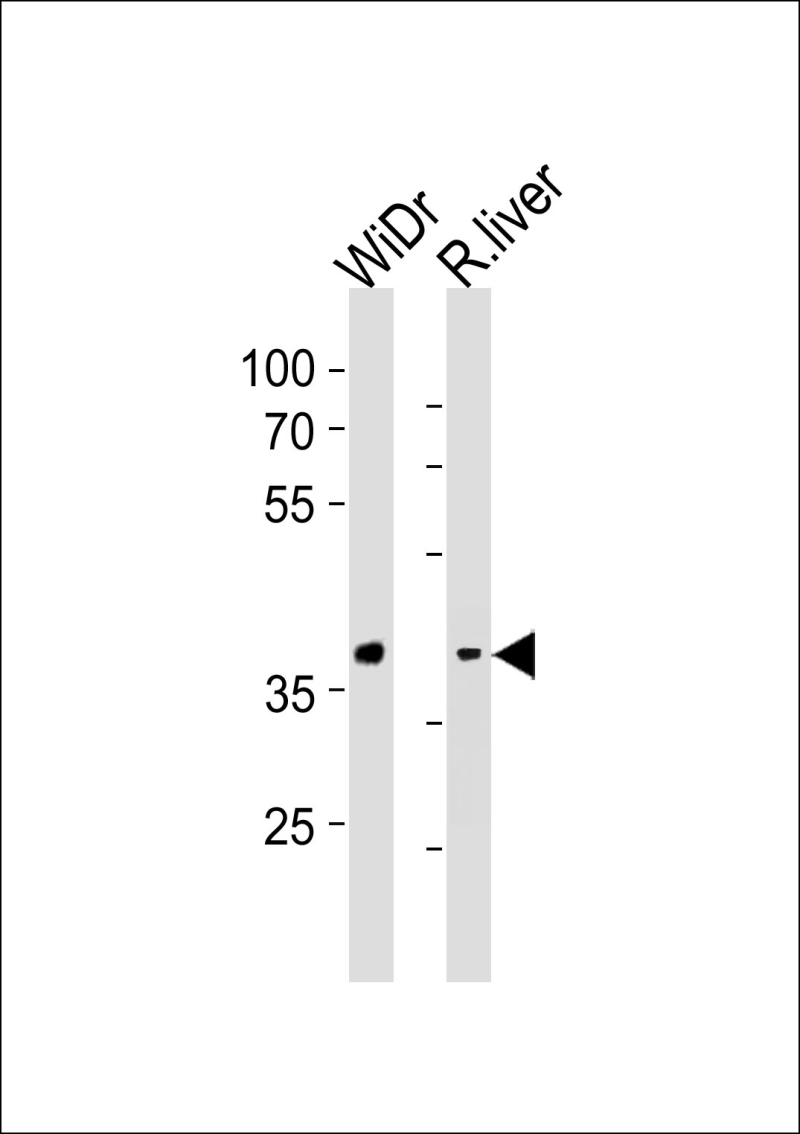
| WB | 1/1000 | Human,Mouse,Rat |
| IF | 咨询技术 | Human,Mouse,Rat |
| IHC | 咨询技术 | Human,Mouse,Rat |
| ICC | 技术咨询 | Human,Mouse,Rat |
| FCM | 咨询技术 | Human,Mouse,Rat |
| Elisa | 咨询技术 | Human,Mouse,Rat |
| Aliases | G-protein coupled receptor 4, G-protein coupled receptor 19, GPR4, GPR19 |
| Entrez GeneID | 2828 |
| WB Predicted band size | 41.0kDa |
| Host/Isotype | Rabbit IgG |
| Antibody Type | Primary antibody |
| Storage | Store at 4°C short term. Aliquot and store at -20°C long term. Avoid freeze/thaw cycles. |
| Species Reactivity | Human, Mouse, Rat |
| Immunogen | This GPR4 antibody is generated from rabbits immunized with a KLH conjugated synthetic peptide between 196-224 amino acids from the Central region of human GPR4. |
| Formulation | Purified antibody in PBS with 0.05% sodium azide. |
+ +
以下是关于GPR4抗体的3篇参考文献摘要(文献标题及内容为模拟示例,具体文献需通过学术数据库核实):
---
1. **标题**: *GPR4-specific monoclonal antibody development and its role in tumor acidosis*
**作者**: Smith A, et al.
**摘要**: 本研究开发了一种高特异性抗GPR4单克隆抗体,验证了其在免疫组化和Western blot中的应用。通过该抗体,作者发现GPR4在肿瘤酸性微环境中高表达,并促进癌细胞迁移和血管生成。
2. **标题**: *Targeting GPR4 in inflammatory diseases: Characterization of a neutralizing antibody*
**作者**: Lee B, et al.
**摘要**: 报道了一种中和性GPR4抗体,能够阻断GPR4介导的pH敏感信号通路。实验表明该抗体可抑制内皮细胞炎症因子释放,为治疗类风湿性关节炎等疾病提供了潜在策略。
3. **标题**: *GPR4 as a pH sensor in renal ischemia-reperfusion injury: Insights from antibody-based inhibition*
**作者**: Chen C, et al.
**摘要**: 利用商业化GPR4抗体研究肾脏缺血再灌注损伤机制,发现GPR4通过感知组织酸化激活NF-κB通路,抗体干预可减轻肾小管细胞凋亡和炎症反应。
---
如需具体文献,建议通过PubMed或Web of Science检索关键词“GPR4 antibody”、“GPR4 inhibitor”获取最新研究。
The GPR4 antibody is a tool used to detect and study G protein-coupled receptor 4 (GPR4), a pH-sensing receptor involved in cellular responses to acidic environments. GPR4. encoded by the GPR4 gene, belongs to a family of proton-sensing receptors that regulate physiological and pathological processes, including angiogenesis, inflammation, and tumor progression. It is activated under extracellular acidic conditions, triggering signaling pathways such as cAMP and MAPK, which influence cell proliferation, migration, and survival. GPR4 is expressed in various tissues, including vascular endothelial cells, immune cells, and certain cancer cells, making it a potential therapeutic target in diseases like cancer, cardiovascular disorders, and chronic inflammation.
Antibodies against GPR4 are essential for elucidating its expression patterns, localization, and functional roles. They are used in techniques like Western blotting, immunohistochemistry, and flow cytometry to investigate GPR4's involvement in acid-mediated cellular responses. Research using GPR4 antibodies has highlighted its contribution to acidosis-related pathologies, such as tumor microenvironment adaptation and inflammatory conditions. Additionally, these antibodies aid in validating experimental models and assessing receptor modulation by potential drugs. As interest grows in targeting pH-sensing mechanisms for therapy, GPR4 antibodies remain critical for both basic research and translational studies aimed at developing treatments for diseases linked to acid-base imbalance.
×